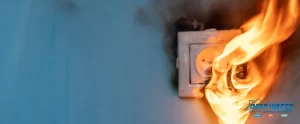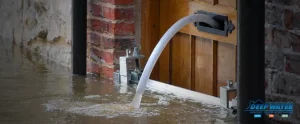In 2020, the National Fire Protection Association or NFPA recorded 490,000 residential fires from over a million reported fires for all types. This data shows that house fires continue to be a major cause of property loss in the country.
A home can catch fire for many reasons. It can simply be due to negligence or carelessness. Still, regardless of the reason, knowing the common causes of fire and preventing them are crucial so more lives and properties can be saved.
What Are the Most Common Causes of Fire?
While there are times when it’s unavoidable, many things that can lead to a fire at home are within your control. Once you know the common causes, you can make necessary changes and preparations to prevent them. Listed below are some of the things you should watch out for:
1. Cooking
According to the NFPA, cooking was responsible for 49 percent of all reported home fires between 2015 and 2019, making it the leading cause of residential fires. It is often due to cooking being left unattended and quickly becoming out of control since no one is in the kitchen to extinguish the fire.
Cooking is also among the common causes of fire during holidays like Christmas and Thanksgiving. Still, it is preventable by simply focusing on what you’re doing and not leaving your cooking unattended. Another great tip is to keep a fire extinguisher in your kitchen that you can easily access in case of accidents.
2. Heating
According to the NFPA, between 2014-2018, local fire departments responded to approximately 48,530 fires involving heating equipment. It represents roughly 14% of all home fires reported during that period, resulting in about 500 civilian deaths and 1,350 injuries.
Heating systems are the most common cause of house fires in the northern states, where the temperatures are often freezing. It is especially true during wintertime when heaters are often used for long periods, exposing them to early wear and tear. If you’re using portable heaters, these can even be more hazardous since they can be placed near flammable things like furniture and walls.
3. Smoking
Smoking indoors is among the common causes of fire, and the two main reasons are due to smoker negligence. Smokers sometimes fall asleep in their beds or on the couch, and their still-lit cigarettes would come into contact with highly flammable materials such as the bedding or the pillows. Sometimes, a smoker fails to put out their cigarettes properly, and the butts would burst into flames, or the embers would fly out of the ashtray and ignite the carpet.
One in four people is killed by a fire caused by smoking; sometimes, the casualty is not even the smoker. To prevent fire damage and fatalities caused by smoking, just try to avoid smoking indoors. If you can’t help it, make sure you put out the cigarettes properly in the ashtray before sleeping or doing anything else.
4. Electrical Systems
Poor electrical work in a home, such as loose wirings, is also among the common causes of fire that some homeowners may not be aware of. It happens most often in older homes with faulty or obsolete wiring. The home electrical system can also be a fire hazard due to excessive dust and debris. To check for dust buildup, remove the outlet and light switch covers. If there’s too much dust, wipe them off carefully with a dry piece of cloth.
5. Candles
Every candle carries the following reminder: “A burning candle should not be left unattended.” Unfortunately, many people take this for granted, especially on holidays like Christmas and New Year’s Day when they get caught up in the celebration. The result is a devastating fire that could have easily been prevented if caution had been observed.
6. Appliances
Anything that produces heat (stoves and clothes dryers) or heats up with prolonged use (computers and electric fans) is a potential fire hazard. They should not be left unattended, especially if used for several hours.
7. Electronic Devices
Devices that use electricity can also be common causes of fire. A charger, for instance, can overheat, catch fire, and ignite nearby furniture. It is also important to ensure that your electronic devices aren’t faulty or too old. If they are, have them checked by a licensed technician to ensure they have not incurred any damage due to frequent use. A piece of electronic equipment that produces a slight burning smell can indicate danger and should be checked right away.
8. Gas Leaks
Natural and propane gases can easily cause home fires because these are combustible substances. Simply put, use these gases with extreme caution. A small leak or a sudden spark can easily lead to a major disaster that will require a fire damage cleanup.
9. Barbecue Grill
Problem with grills is more prevalent in summer than in any other season. Regardless of when they are used, flames from a barbecue grill can be difficult to manage, especially when the equipment has unseen damage. Accidental grill fires can be avoided by checking for gas leaks before using the equipment.
10. Fireplace
A fireplace can also cause fires, which could happen when a log sparks and sends embers flying in the air. While this can be a rare case, it’s still possible, especially if your indoor fireplace is located in the middle of a room close to flammable materials such as the carpet or the couch.
11. Lightning
Lightning fires often occur during summer when afternoon and evening storms peak. If your house is the only tall structure in a vast open space, it can be struck by lightning during a thunderstorm, leading to a blaze.
12. Children
House fires are sometimes started by small children who are left alone to play on their own. One such scenario to look out for is if they’re able to reach the matches and cause a fire in their homes. Although it is impossible to stop their curiosity, you can significantly reduce the chances of house fires caused by children by teaching them about a fire’s destructive powers. Another foolproof way to address this problem is to make sure matches, lighters, and flammable materials are way out of your children’s reach.
Key Takeaway
Fire is one disaster that every homeowner wants to avoid at all costs. It is not entirely impossible because many common causes of fire can easily be prevented if precautions are taken. For instance, smoking while in bed is a virtual fire starter, but this need not happen if you just smoke outside. Similarly, a fire in the kitchen can be avoided if you don’t leave your cooking unattended.
Many other things that can set a fire off, like appliances, electrical supplies, barbecue grills, and electronic devices, can remain fire-safe if you put them under regular inspections. Otherwise, you’re setting the stage for a disaster that will require major restoration works.
Deep Water Emergency Services and Restoration is the expert in water damage restoration.
Fire is a difficult disaster because, apart from the emotional trauma it brings, you also have to worry about the reconstruction work that needs to be done on your ruined property, which can be quite expensive. But, in the event that you need some restoration help after a house fire, Deep Water Emergency Services and Restoration is just a call away. We are here to help you deal with the damages caused by fire.
Contact our fire damage restoration Colorado Springs team to find out the best and affordable way of restoring your home. Rest assured that we are ready to work with you so you can get back to normal living as soon as possible. Call us now.






